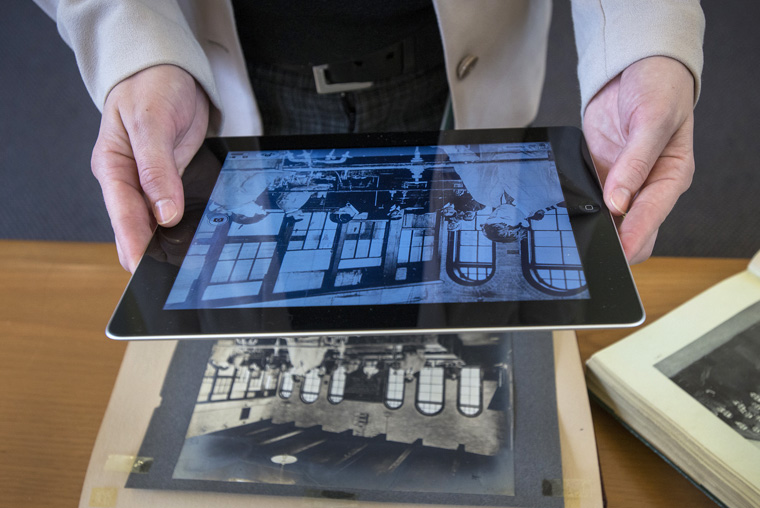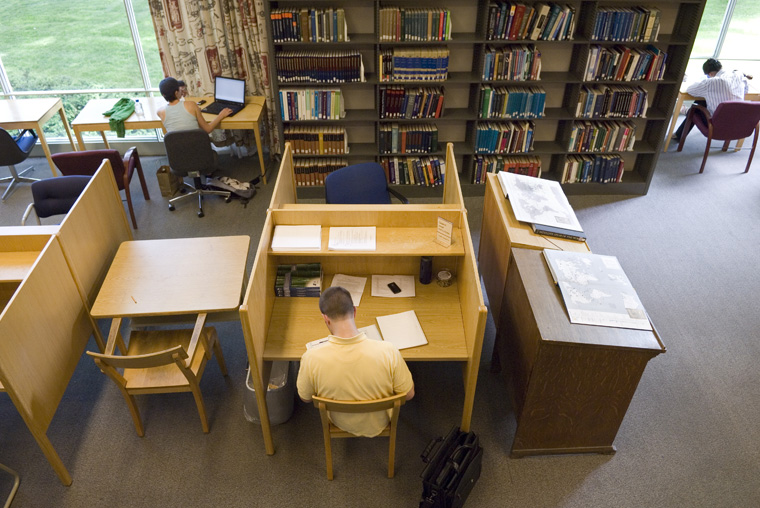About the Ad Hoc Task Force on the Future of Libraries
Provost Martin Schmidt has charged the Director of Libraries, Chris Bourg, to convene an Ad Hoc Task Force on the Future of Libraries, comprised of faculty, staff, and students from across the Institute. Meet the Task Force members.
Full charge of the Task Force
 The mission of great research libraries has always been to advance research and learning
by ensuring immediate and enduring access to the scholarly record and to the tools and
expertise necessary to discover, use, and create knowledge. At MIT, our libraries are
interdisciplinary spaces, virtual and physical, where students, faculty, and other community
members can find the resources, technologies and expertise they need to advance knowledge
and to serve the world.
The mission of great research libraries has always been to advance research and learning
by ensuring immediate and enduring access to the scholarly record and to the tools and
expertise necessary to discover, use, and create knowledge. At MIT, our libraries are
interdisciplinary spaces, virtual and physical, where students, faculty, and other community
members can find the resources, technologies and expertise they need to advance knowledge
and to serve the world.
Transformative changes in culture, technology, publishing, research, and pedagogy require equally transformative changes in research libraries; both in response to a changing scholarly landscape and as a catalyst for new ways of producing, using, and preserving knowledge. As MIT takes the lead in helping to reinvent the future of education, so too must we take the lead on reinventing the future of research libraries.
I have asked the Director of Libraries, Chris Bourg, to convene and lead an Ad Hoc Task Force on the Future of Libraries, composed of faculty, staff, and students from across the Institute. The Task Force is charged with seeking broad input from the MIT community and from domain experts, on how the MIT Libraries ought to evolve to best advance the creation, dissemination, and preservation of knowledge; and to serve as a leader in the reinvention of research libraries.
I am asking the Task Force to think broadly about the role of the MIT Libraries at the Institute and in the world, and to work with the Director and her staff to develop a bold new vision for a library system that embodies MIT’s emphasis on excellence, innovation, and service.
 The Task Force should complete its work during the 2015-2016 Academic Year, with the goal
of submitting a report and set of recommendations to me before the end of the Spring
Semester.
The Task Force should complete its work during the 2015-2016 Academic Year, with the goal
of submitting a report and set of recommendations to me before the end of the Spring
Semester.
The Task Force should gather input from key constituents and subject matter experts in considering a wide range of topics related to libraries, information access, and scholarly communication, including:
- The role the MIT Libraries might play in developing innovative tools, platforms, services, and techniques for the acquisition, organization, discovery, use, production, and preservation of digital and analog information
- How the libraries ought to serve the local and global community of scholars in advancing MIT’s mission of sharing the Institute’s outputs with the world; and in promoting policies, ideas, and initiatives that advance MIT’s values
- How the Institute might best leverage library expertise in areas such as information and media literacy, data management, digital preservation, metadata creation and management, digital humanities, geospatial information and analysis, information sciences, content management, open access publishing, and much more
- The optimal role and design of the physical library spaces at MIT, to include spaces for quiet and collaborative study and research, for teaching and learning with technology, for consulting with library experts, and for encountering and working with tangible collections
- The role of tangible collections, including archival and special collections, in the intellectual life of the Institute; and how the libraries might best be organized, resourced, staffed, and designed to enhance productive uses of tangible collections within the community
- The role of the library in equipping students across disciplines with the skills and habits needed to thrive in and potentially influence a complex and evolving information landscape
- The role of the library as an interdisciplinary gathering space where community members have access to a broad and inclusive range of information, expertise, and perspectives; and where the free and informed exchange of ideas is both encouraged and cultivated; and where the environment inspires new forms of scholarly inquiry and collaboration
- The kinds of collaborations and partnerships – within the Institute, with the global library community, and with external non-profit and commercial players – the libraries ought to pursue to advance library values and missions and MIT’s priorities
- How the Libraries services, expertise and facilities should evolve to aid MIT’s competitive advantage in recruiting new faculty and researchers and to enhance the residential experience for its prospective students
 This Task Force represents a unique opportunity for the MIT community to consider the ways
in which the MIT Libraries might make unique and transformative contributions to defining
new models for a modern, innovative research library. As such, I encourage all of us to
take advantage of opportunities to engage with the Task Force throughout the year on these
issues and other topics related to information, scholarly communication, and the role of
research libraries.
This Task Force represents a unique opportunity for the MIT community to consider the ways
in which the MIT Libraries might make unique and transformative contributions to defining
new models for a modern, innovative research library. As such, I encourage all of us to
take advantage of opportunities to engage with the Task Force throughout the year on these
issues and other topics related to information, scholarly communication, and the role of
research libraries.